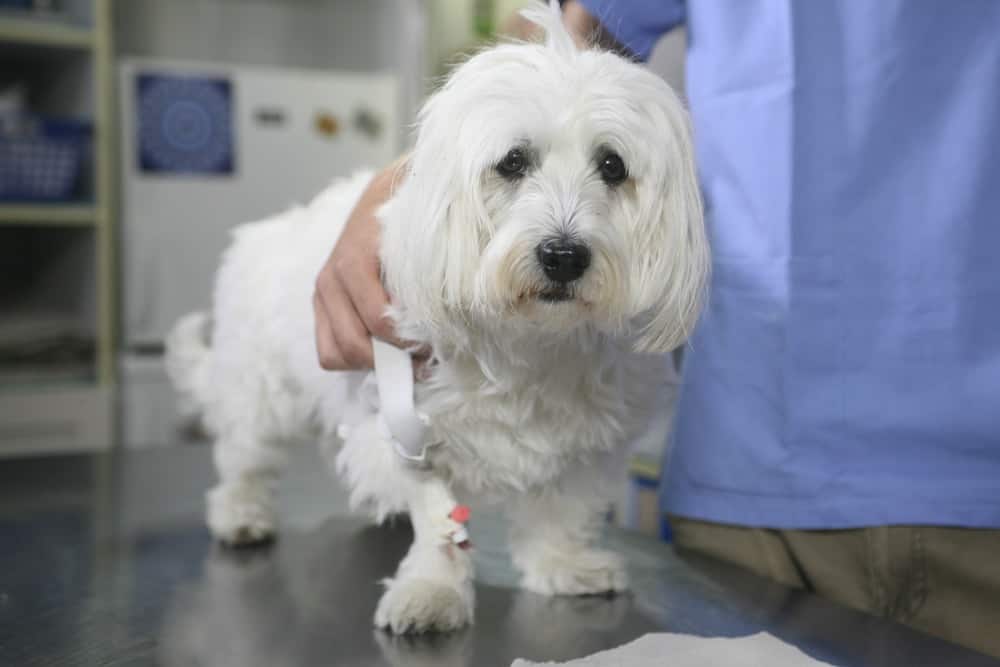6 Signs of Underlying Health Issues in Your Dog + What to Do
By Nicole McCray
Unfortunately, dogs can’t tell us when they’re not feeling well. And, they also try to hide their symptoms because of their natural survival instinct. That means it’s up to us as pet parents to learn how to recognize the subtle signs of underlying health issues in dogs, so we can keep them healthy and pain-free. Remember, you know your dog better than anyone else! Always trust your instincts and call the vet if you suspect a problem.

Signs Your Dog is Experiencing a Health Emergency
If your dog is showing any of the following signs, he is experiencing a health emergency and should see his vet right away or be taken to the closest emergency animal hospital if it’s after hours.
- Labored breathing
- Unresponsiveness
- Sudden inability to walk
- Severe wound/bleeding
- Signs of acute pain (loud crying, extreme aggression, guarding one area of the body)
- Sudden change in cognitive function
- Blue or pale gums
- Collapse/loss of consciousness
- Severe vomiting or diarrhea
- Extremely tight or bloated stomach
- Seizures
- Temperature under 99 F or above 104 F (Normal dog temp is 100.5 to 102.5 F)
Subtle Signs of Underlying Health Issues in Dogs
Here’s how to recognize the more subtle signs that your dog isn’t feeling well and what they might mean.
- Appetite Changes
Just like people, every dog has different eating habits. Some dogs are voracious eaters while others tend to pick at their food. However, if your normally good eater suddenly has a poor appetite, that’s cause for concern. Although a lack of appetite doesn’t always indicate an emergency, if it’s accompanied by vomiting, diarrhea, or lethargy, call the emergency vet.
Many things can cause a lack of appetite, including an infection, kidney or liver disease, or a vaccine reaction. If you suspect your dog could be experiencing tooth or mouth pain, visiting your local dog dentist will help you find the cause and get it resolved so your pup can eat comfortably again.

On the other hand, if your dog normally picks at his food and suddenly becomes ravenously hungry, it could indicate thyroid problems, diabetes, lack of nutrient absorption, or it could simply be a side effect of certain medications.
Appetite changes can also be a sign of environmental stress or changes in diet, but if you notice your dog is acting differently for more than a day or two, or he has additional symptoms, call the vet to rule out underlying health concerns.
- Lethargy
A dog can be relaxed and laid back, but that doesn’t mean he’s lethargic. It’s normal for dogs to spend a lot of time dozing and sleeping, so that alone isn’t cause for concern. And, keep in mind that senior dogs will sleep even more as they age.
However, lethargy becomes an issue when it’s out of character for your dog. For example, if your normally active dog no longer seems interested in activities he normally loves, there may be a problem. A checkup at the vet will put your mind at ease and rule out an underlying condition.
- Excessive Thirst and Urination
It’s perfectly normal for dogs to drink more when it’s hot or when they’re playing hard, which will also cause them to urinate more. However, excessive thirst and urination without a reasonable explanation are cause for concern.
If your pup can’t seem to get enough to drink, urinates excessively, strains to pee, or is having uncharacteristic accidents in the house, it’s time for a checkup. These symptoms could indicate bladder or kidney stones, hormonal disorders, an infection, cognitive issues, or be a side effect of medication.
- Digestive Issues
Digestive issues like vomiting and diarrhea are pretty easy to spot, and if they continue for more than a day or become acute, it’s time to see the vet to find the cause and prevent dehydration.

Although your dog could simply have an upset stomach, these issues could indicate a variety of serious concerns, including poisoning, cancer, or life-threatening bloat or torsion.
It’s best to take these conditions seriously, but they don’t always indicate an emergency. Some dogs have digestive issues due to stress, over-stimulation, or diet changes. However, if these issues are accompanied by blood in the stool, dry heaving, drooling, restlessness, or pain or swelling in the stomach seek veterinary care immediately.
- Behavior Changes
You’ve probably already noticed that your dog is a creature of habit. So, when his predictable behavior suddenly changes, it should raise a red flag. For example, if your normally excited dog sleeps right through the UPS delivery, snaps at his buddy during playtime, or gets irritated with other animals or people he normally loves, he might not be feeling well.
Behavior changes are more common in senior dogs who may be experiencing joint pain, hearing and vision loss, or memory problems. Often, these symptoms are accompanied by sleep issues, restlessness, pacing, staring, increased vocalization, anxiety, or reclusiveness.
Although some deterioration in seniors is inevitable, extreme changes could indicate cognitive dysfunction, commonly called doggy dementia. Of course, it’s heartbreaking to witness, but your vet may be able to manage it with medication and recommend some lifestyle changes to help your dog stay comfortable.
- Respiratory Issues
Respiratory issues are less subtle than other symptoms. Things like coughing, sneezing, wheezing, nasal discharge, and uncharacteristic snoring should all be observed carefully and reported to the vet.
Although it may be nothing more than allergies or a cold, it could also be something more serious like an infection or a heart condition.

Keep in mind that dogs who are overweight and flat-faced (brachycephalic) breeds like pugs and bulldogs are more prone to serious respiratory and heart problems. They have a much higher risk of respiratory distress and collapse.
In Conclusion
Anytime you suspect that your dog isn’t feeling well, it’s best to give the vet a call rather than waiting for the illness to progress. Your vet will conduct blood work and urinalysis to determine if there’s something wrong and how to treat it. Your quick action could dramatically improve your dog’s prognosis!
About the Author: Nicole McCray
Nicole is a die-hard animal lover who has worked in pet care for years. She is a former vet technician, a dog mom to her two rescue pups, and she grew up living and working at her family’s pet boarding facility. She loves using her writing talents to share the insight she’s learned throughout her career in the hopes that her knowledge can help other pet parents out there!





Cautions. Everything information about medication.
get cheap clomid price
Actual trends of drug. safe and effective drugs are available.
generic tadalafil daily – https://tadalafilfst.com/#
deep web drug store deep web markets
buy cheap propecia tablets https://propecia.cheap/# – buying generic propecia without insurance
darknet marketplace dark website
lana rhoades – https://lanarhoades.fun/ lana rhoades modeli